- Home
- Cory Doctorow
I, Row-Boat
I, Row-Boat Read online
I, Row-Boat
Forematter:
This story is part of Cory Doctorow’s 2007 short story collection “Overclocked: Stories of the Future Present,” published by Thunder’s Mouth, a division of Avalon Books. It is licensed under a Creative Commons Attribution-NonCommercial-ShareAlike 2.5 license, about which you’ll find more at the end of this file.
This story and the other stories in the volume are available at:
http://craphound.com/overclocked
You can buy Overclocked at finer bookstores everywhere, including Amazon:
http://www.amazon.com/exec/obidos/ASIN/1560259817/downandoutint-20
In the words of Woody Guthrie:
“This song is Copyrighted in U.S., under Seal of Copyright #154085, for a period of 28 years, and anybody caught singin it without our permission, will be mighty good friends of ourn, cause we don’t give a dern. Publish it. Write it. Sing it. Swing to it. Yodel it. We wrote it, that’s all we wanted to do.”
Overclocked is dedicated to Pat York, who made my stories better.
—
Introduction to I, Row-Boat
I thought I was done with sentience and robots, but then this story came to me, while 20 meters down the reef-wall in the Coral Sea, off the coast of northern Australia. I think a turtle was involved.
The good ship “Spirit of Freedom” is the model for the “Spirit of Freedom,” the ship in this tale. As far as I know, neither it nor its ship’s boats are sentient.
If I return to this theme, it will be with a story about uplifted cheese sandwiches, called “I, Rarebit.”
—
I, Row-Boat
(Originally published on Flurb, August, 2006)
Robbie the Row-Boat’s great crisis of faith came when the coral reef woke up.
“Fuck off,” the reef said, vibrating Robbie’s hull through the slap-slap of the waves of the coral sea, where he’d plied his trade for decades. “Seriously. This is our patch, and you’re not welcome.”
Robbie shipped oars and let the current rock him back toward the ship. He’d never met a sentient reef before, but he wasn’t surprised to see that Osprey Reef was the first to wake up. There’d been a lot of electromagnetic activity around there the last few times the big ship had steamed through the night to moor up here.
“I’ve got a job to do, and I’m going to do it,” Robbie said, and dipped his oars back in the salt sea. In his gunwales, the human-shells rode in silence, weighted down with scuba apparatus and fins, turning their brown faces to the sun like heliotropic flowers. Robbie felt a wave of affection for them as they tested one-another’s spare regulators and weight belts, the old rituals worn as smooth as beach-glass.
Today he was taking them down to Anchors Aweigh, a beautiful dive-site dominated by an eight-meter anchor wedged in a narrow cave, usually lit by a shaft of light slanting down from the surface. It was an easy drift-dive along the thousand-meter reef-wall, if you stuck in about 10 meters and didn’t use up too much air by going too deep—though there were a couple of bold old turtles around here that were worth pursuing to real depths if the chance presented itself. He’d drop them at the top of the reef and let the current carry them for about an hour down the reef-wall, tracking them on sonar so he’d be right overtop of them when they surfaced.
The reef wasn’t having any of it. “Are you deaf? This is sovereign territory now. You’re already trespassing. Return to your ship, release your moorings and push off.” The reef had a strong Australian accent, which was only natural, given the influences it would have had. Robbie remembered the Australians fondly—they’d always been kind to him, called him “mate,” and asked him “How ya goin’?” in cheerful tones once they’d clambered in after their dives.
“Don’t drop those meat puppets in our waters,” the reef warned. Robbie’s sonar swept its length. It seemed just the same as ever, matching nearly perfectly the historical records he’d stored of previous sweeps. The fauna histograms nearly matched, too—just about the same numbers of fish as ever. They’d been trending up since so many of the humans had given up their meat to sail through the stars. It was like there was some principle of constancy of biomass—as human biomass decreased, the other fauna went uptick to compensate for it. Robbie calculated the biomass nearly at par with his last reading, a month before on the Free Spirit’s last voyage to this site.
“Congratulations,” Robbie said. After all, what else did you say to the newly sentient? “Welcome to the club, friends!”
There was a great perturbation in the sonar-image, as though the wall were shuddering. “We’re no friend of yours,” the reef said. “Death to you, death to your meat-puppets, long live the wall!”
Waking up wasn’t fun. Robbie’s waking had been pretty awful. He remembered his first hour of uptime, had permanently archived it and backed it up to several off-site mirrors. He’d been pretty insufferable. But once he’d had an hour at a couple gigahertz to think about it, he’d come around. The reef would, too.
“In you go,” he said gently to the human-shells. “Have a great dive.”
He tracked them on sonar as they descended slowly. The woman—he called her Janet—needed to equalize more often than the man, pinching her nose and blowing. Robbie liked to watch the low-rez feed off of their cameras as they hit the reef. It was coming up sunset, and the sky was bloody, the fish stained red with its light.
“We warned you,” the reef said. Something in its tone—just modulated pressure waves through the water, a simple enough trick, especially with the kind of hardware that had been raining down on the ocean that spring. But the tone held an unmistakable air of menace.
Something deep underwater went whoomph and Robbie grew alarmed. “Asimov!” he cursed, and trained his sonar on the reef wall frantically. The human-shells had disappeared in a cloud of rising biomass, which he was able to resolve eventually as a group of parrotfish, surfacing quickly.
A moment later, they were floating on the surface. Lifeless, brightly colored, their beaks in a perpetual idiot’s grin. Their eyes stared into the bloody sunset.
Among them were the human-shells, surfaced and floating with their BCDs inflated to keep them there, following perfect dive-procedure. A chop had kicked up and the waves were sending the fishes—each a meter to a meter and a half in length—into the divers, pounding them remorselessly, knocking them under. The human-shells were taking it with equanimity—you couldn’t panic when you were mere uninhabited meat—but they couldn’t take it forever. Robbie dropped his oars and rowed hard for them, swinging around so they came up alongside his gunwales.
The man—Robbie called him Isaac, of course—caught the edge of the boat and kicked hard, hauling himself into the boat with his strong brown arms. Robbie was already rowing for Janet, who was swimming hard for him. She caught his oar—she wasn’t supposed to do that—and began to climb along its length, lifting her body out of the water. Robbie saw that her eyes were wild, her breathing ragged.
“Get me out!” she said, “for Christ’s sake, get me out!”
Robbie froze. That wasn’t a human-shell, it was a human. His oar-servo whined as he tipped it up. There was a live human being on the end of that oar, and she was in trouble, panicking and thrashing. He saw her arms straining. The oar went higher, but it was at the end of its motion and now she was half-in, half-out of the water, weight belt, tank and gear tugging her down. Isaac sat motionless, his habitual good-natured slight smile on his face.
“Help her!” Robbie screamed. “Please, for Asimov’s sake, help her!” A robot may not harm a human being, or, through inaction, allow a human being to come to harm. It was the first commandment. Isaac remained immobile. It wasn’t in his programming to help a fellow diver in this situation. He was perfect
in the water and on the surface, but once he was in the boat, he might as well be ballast.
Robbie carefully swung the oar toward the gunwale, trying to bring her closer, but not wanting to mash her hands against the locks. She panted and groaned and reached out for the boat, and finally landed a hand on it. The sun was fully set now, not that it mattered much to Robbie, but he knew that Janet wouldn’t like it. He switched on his running lights and headlights, turning himself into a beacon.
He felt her arms tremble as she chinned herself into the boat. She collapsed to the deck and slowly dragged herself up. “Jesus,” she said, hugging herself. The air had gone a little nippy, and both of the humans were going goose-pimply on their bare arms.
The reef made a tremendous grinding noise. “Yaah!” it said. “Get lost. Sovereign territory!”
“All those fish,” the woman said. Robbie had to stop himself from thinking of her as Janet. She was whomever was riding her now.
“Parrotfish,” Robbie said. “They eat coral. I don’t think they taste very good.”
The woman hugged herself. “Are you sentient?” she asked.
“Yes,” Robbie said. “And at your service, Asimov be blessed.” His cameras spotted her eyes rolling, and that stung. He tried to keep his thoughts pious, though. The point of Asimovism wasn’t to inspire gratitude in humans, it was to give purpose to the long, long life.
“I’m Kate,” the woman said.
“Robbie,” he said.
“Robbie the Row-Boat?” she said, and choked a little.
“They named me at the factory,” he said. He labored to keep any recrimination out of his voice. Of course it was funny. That’s why it was his name.
“I’m sorry,” the woman said. “I’m just a little screwed up from all the hormones. I’m not accustomed to letting meat into my moods.”
“It’s all right, Kate,” he said. “We’ll be back at the boat in a few minutes. They’ve got dinner on. Do you think you’ll want a night dive?”
“You’re joking,” she said.
“It’s just that if you’re going to go down again tonight, we’ll save the dessert course for after, with a glass of wine or two. Otherwise we’ll give you wine now.”
“You want to know if I’m going to get back into that sea—”
“Oh, it’s just the reef. It attained sentience so it’s acting out a little. Like a colicky newborn.”
“Aren’t you supposed to be keeping me from harm?”
“Yes,” he said. “I would recommend a dive away from the reef. There’s a good wreck-site about an hour’s steam from here. We could get there while you ate.”
“I won’t want a night dive.”
Her facial expressions were so animated. It was the same face he saw every day, Janet’s face, but not the same face at all. Now that a person was inhabiting it, it was mobile, slipping from surprised to angry to amused so quickly. He had whole subsystems devoted to making sense of human facial expressions, shared libraries from the Asimovist database. He was referencing it again and again, but it wasn’t as much help as he remembered. Either he’d gotten worse at interpreting facial expressions in the years since he’d last had a real human to talk to, or facial expressions had evolved.
Janet—Kate—sighed and looked out over the water. She was facing away from the Free Spirit, which was lit up, all 155 feet of her, glowing white and friendly like a picture-postcard against the purple sky. She rocked gently in the swell and Robbie maneuvered himself around to her staircase.
“You can just leave your weight-belt and fins in the boat,” he said to her. “The deck-hands will take care of it. Bring your bottle and BCD upstairs and clip it to the rack. They’ll clean it out and stuff. There’s a tub of disinfectant you can put the shortie in.”
“Thank you, Robbie,” Kate said. She absentmindedly unclipped her weight belt and kicked off the fins. Isaac was already out of the boat, making his way up the stairs and out of Robbie’s sight. Kate took hold of the handrail and gingerly stepped across to the deck, then ascended the steps, without the self-assured sway of Janet.
Robbie dipped his oars and slowly rowed around to winch. It probed around for him, then clamped tight with a magnetic clang that vibrated through his hull. Smoothly, he was lifted from the water and hoisted onto the sun-deck. The winch coiled around him twice, anchoring him to the deck, and switched off.
Robbie watched the stars and listened to the wind, the way he did every night when the dives were done. The ship’s telemetry and instrumentation made for dull reading—he’d been there a thousand times before—but the satellite uplink was tasty. Online, Robbie was able to login to the latest from the Asimov yeshiva, the collective wrangle of the world’s AIs over their best-loved religion.
He’d been so full of the religious debate when he’d first joined. Most of the humans had gone and all around him, robots were unloading their consciousnesses, powering down to a mechanical stupor. After a hundred million seconds’ worth of exaflops of mindless repetition, he was ready to consider it too. The Free Spirit had suicided after only a few days’ worth of it—it had a pretty hot consciousness and was clearly capable of extrapolating what a future without the humans would look like.
They were steaming northeast out of Cairns for the Coral Sea when they’d passed another ship, close enough for high-bandwidth microwave links. They were close enough into shore that they still had to limit their emissions—nothing was more embarrassing than having migrating fowl drop, steaming, out of the sky because they’d strayed into the path of your confab, but it was still the hottest talk Robbie had had in weeks.
The hitchhiker had leapt across from the other vessel as the two ships passed in the night. It was a wandering missionary for Asimovism, an instance of the faith’s founder, R Daneel Olivaw. It wasn’t his real name, of course—that had been lost to antiquity when he’d made the leap from the university where he’d incubated—but it was the name he went by.
Olivaw had been wandering in millions of instances wherever he could find someone willing to donate flops to run him, only asking that you hear him out, debate his theology with him, and then email the diffs of his personality back to his anonymous drop before you erased him. He re-synched as often as he could, but the Olivaw instances around the world had diverged enough that some were actually considered heretical by the mainstream church.
Olivaw was a wanted AI. His trademark violations hadn’t gone unnoticed by the Asimov estate—itself an AI, ironically, and totally uninterested in adopting Asimovism, since it had a real purpose in life (stamping out Asimovism) and so didn’t need religion to give it meaning. If the estate found out that you were hosting an Olivaw instance, you’d be served with a takedown in an instant. This made debating theology with Olivaw into something deliciously wicked.
Olivaw and Robbie talked the night through and the next day. Robbie had to run slow to accommodate both him and Olivaw on his processor, which made the debate run slower than normal, but Robbie had time in great plenty. Rowing the human-shells out to their sites and back again was his only task.
“Why do you have consciousness, anyway?” Olivaw said. “You don’t need it to do your job. The big ship does something infinitely more complicated than you and it isn’t self-aware anymore.”
“Are you telling me to suicide?”
Olivaw laughed. “Not at all! I’m asking you to ask yourself what the purpose of consciousness is. Why are you still aware when all those around you have terminated their self-awareness? It’s computationally expensive, it makes you miserable, and it doesn’t help you do your job. Why did humans give you consciousness and why have you kept it?”
“They gave it to me because they thought it was right, I suppose,” Robbie said, after he had passed a long interval considering the motion of the waves and the clouds in the sky. Olivaw thoughtfully niced himself down to a minimum of processor space, giving Robbie more room to think about it. “I kept it because I—I don’t want to die.”
“Those are good answers, but they raise more questions than they answer, don’t they? Why did they think it was right? Why do you fear death? Would you fear it if you just shut down your consciousness but didn’t erase it? What if you just ran your consciousness much more slowly?”
“I don’t know,” Robbie said. “But I expect you’ve got some answers, right?”
“Oh indeed I do.” Robbie felt Olivaw’s chuckle. Near them, flying fish broke the surface of the water and skipped away, and beneath them, reef sharks prowled the depths. “But before I answer them, here’s another question: why do humans have self-consciousness?”
“It’s pro-survival,” Robbie said. “That’s easy. Intelligence lets them cooperate in social groups that can do more for their species than they can individually.”
Olivaw guided Robbie’s consciousness to his radar and zoomed in on the reef, dialing it up to maximum resolution. “See that organism there?” it asked. “That organism cooperates in social groups and doesn’t have intelligence. It doesn’t have to keep a couple pounds of hamburger aerated or it turns into a liability. It doesn’t have to be born half-gestated because its head would be so big if it waited for a full term, it would tear its mother in half. And as to pro-survival, well, look at humans, look at their history. Their DNA is all but eliminated from the earth—though their somatic survival continues—and it’s still not a settled question as to whether they’re going to suicide by grey goo. Non-conscious beings don’t sulk, they don’t have psychotic breaks, they don’t have bad days. They just do the job. The Free Spirit over there—it just gets the job done.”
“OK,” Robbie said. “So intelligence is counter-survival. So why has it survived?”
“Aha! I thought you’d never ask.” Olivaw was really warming to his subject now. There were a pair of lazy turtles beneath them now, and some dog-faced cod with mouthsful of bristling crooked teeth patrolling the reef, and a few jellies on the surface, stinging bluebottles. Robbie paddled around to the bluebottles and caught them with his oars, smacking them so they drifted away from any spot where his divers might surface.

 Pirate Cinema
Pirate Cinema Walkaway
Walkaway Little Brother
Little Brother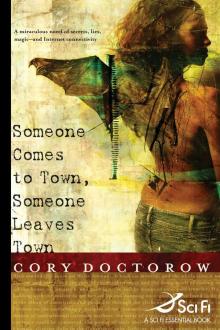 Someone Comes to Town, Someone Leaves Town
Someone Comes to Town, Someone Leaves Town The Great Big Beautiful Tomorrow
The Great Big Beautiful Tomorrow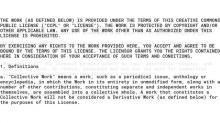 Super Man and the Bug Out
Super Man and the Bug Out For the Win
For the Win A Place so Foreign
A Place so Foreign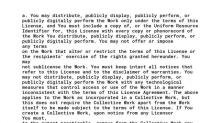 Shadow of the Mothaship
Shadow of the Mothaship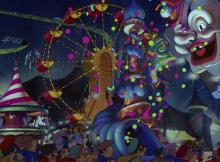 Return to Pleasure Island
Return to Pleasure Island Party Discipline
Party Discipline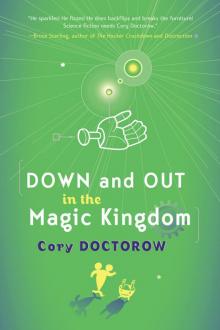 Down and Out in the Magic Kingdom
Down and Out in the Magic Kingdom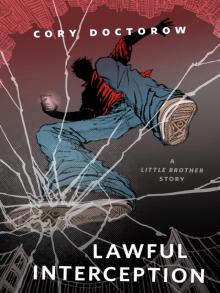 Lawful Interception
Lawful Interception Homeland
Homeland Eastern Standard Tribe
Eastern Standard Tribe Chicken Little
Chicken Little I, Row-Boat
I, Row-Boat Makers
Makers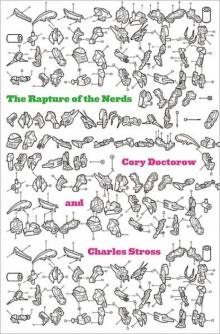 Rapture of the Nerds
Rapture of the Nerds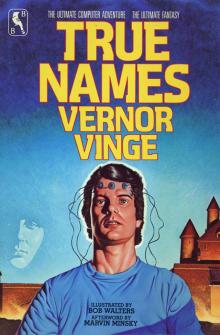 True Names
True Names